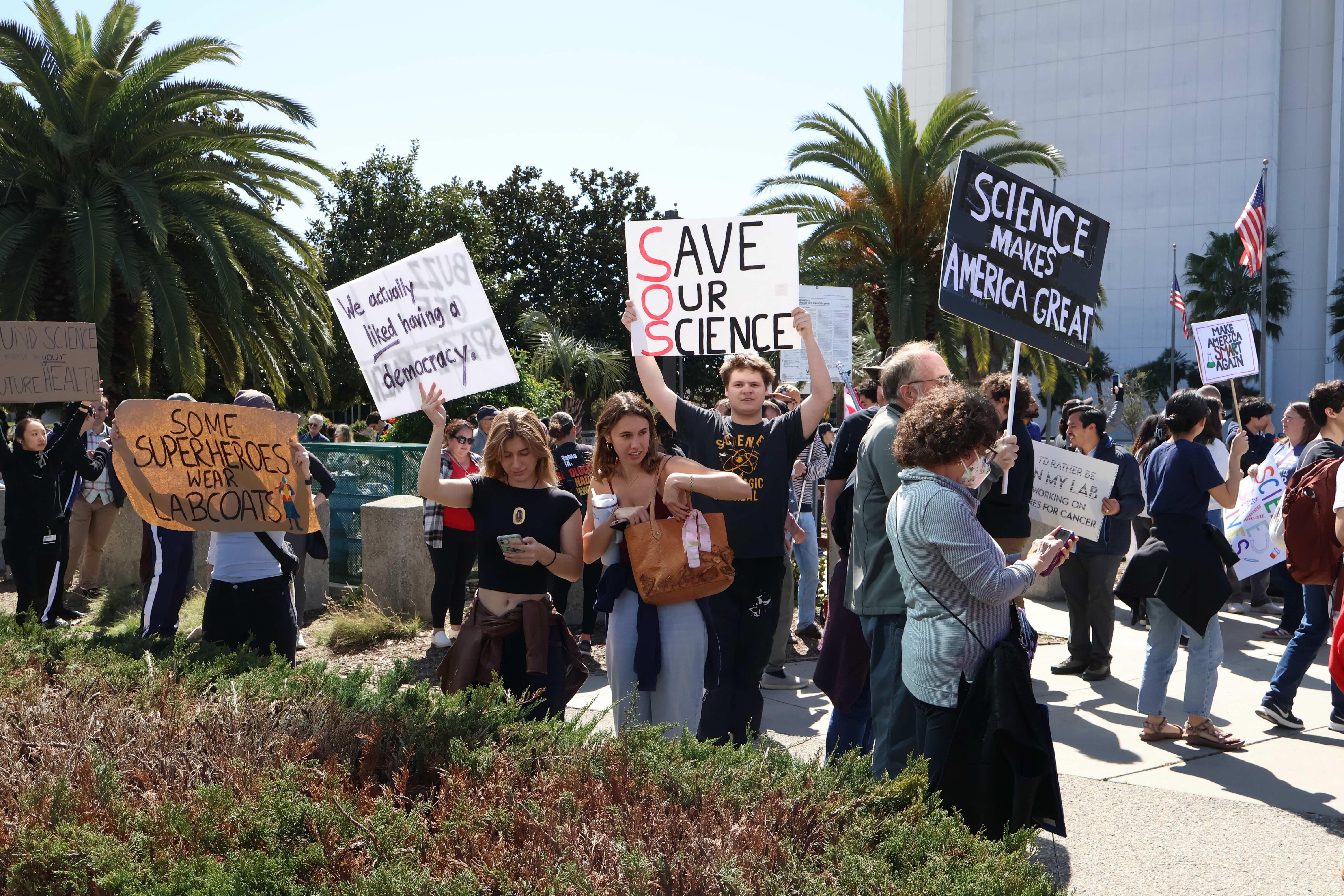Over 1,000 people – including students and scientists – protested Trump administration executive orders related to science and health at a Stand Up For Science rally Friday.
Protesters gathered at noon at the intersection of Wilshire Boulevard and Veteran Avenue to protest, hear speeches and write letters to government representatives. The event – protesting policies on National Institutes of Health cuts, the Paris Climate Agreement withdrawal and diversity, equity and inclusion initiatives – was organized by many UCLA scientists, postdoctoral researchers, doctoral students and graduate students.
Many scientists said they were disappointed at the decision to cut grants from the NIH, which many UCLA labs use to fund programs and research. Protesters held signs, including some that said, “Cut the cuts, not the cure,” and, “Research is the heartbeat of progress” and chanted, “Whose labs? Our labs!” and, “Research funding is under attack! What do we do? Stand up! Fight back!”
Sydney Campbell, a UCLA postdoctoral scholar, said she has been organizing events related to the NIH cuts, as she believes many of the Trump administration’s decisions will be detrimental to cancer research. She added that she believes now is an important time for scientists to speak out against these decisions.
Margarid Turnamian, another organizer of the event and a clinical psychology graduate student at the University of Southern California, said she was angry and frustrated with the changes in federal policy. She added that she reached out to faculty at USC and students at UCLA to make a meaningful impact.
Turnamian said the main goal of the protest was to show federal employees in Los Angeles that they care about this issue – with some researchers leaving their labs to advocate.
“This all trickles down to patients, to communities, to every single person in our country and even, maybe in the world,” Turnamian said. “We collaborate with people in different countries, and these policies have impacts in all of that work.”

Many protestors hold signs around the corner of Wilshire Boulevard and Veteran Avenue. (Maggie Konecky / Daily Bruin)
Jane Shevtsov, an academic administrator in the UCLA Department of Life Sciences, said she joined the walkout because she believes the Trump administration is limiting scientists’ ability to decide what they may research. She added that she was upset that the Trump administration pulled out from the Paris Climate Agreement and the World Health Organization.
Aditya Iyer, a bioinformatics doctoral student, said he was inspired to join the movement by a quote from Thucydides, a Greek historian, who said, “A society that separates its scholars from warriors has its thinking done by cowards and its fighting done by fools.”
Protesters gathered to hear speeches, first at 12:15 p.m. and again at 1 p.m. Duke Han, a professor at USC’s Keck School of Medicine who researches Alzheimer’s disease, said in his speech that the cuts interrupted the most critical period of research that he had experienced in his 20 years as a scientist.
“Finally being right on the precipice of having some way to make a dent into this devastating disease, and we have an administration that’s cutting things right at the worst possible moment,” Han said in his speech. “This is something that we have to rally behind.”
Jess Phoenix, a volcanologist and former Democratic congressional candidate, said in a speech at the protest that science was a “shared human heritage” and called upon scientists to find support in their communities in order to defend their field.
Jennifer Silvers, an associate professor of psychology at UCLA, said in another speech that she was protesting to defend both her field and her children – one of whom is disabled and relies on medical research in her daily life.
“Anyone who tells you that they’re cutting science to reduce fat, reduce bloat, reduce corruption, is lying to your face,” Silvers said in her speech. “We are the soundest investment you can make from a financial perspective as well as a health one.”
Shevtsov also said the Trump administration needs to be supportive of science rather than skeptical of it, adding that scientists should be able to exercise the freedom to choose the topics they would like to research.
“We are skeptical of each other, that’s how science works,” Shevtsov said. “If I make a mistake, if I have a bias, somebody else will see it, somebody else will call me out.”
Iyer said he also believes the scientific community will be strengthened by protests, with scientists coming together over sharing a common goal.
Campbell added that she hopes more people can interact with scientists more often to dispel distrust in science.
“My pure motivation for doing science is to make people’s lives better and to find a cure for cancer,” Campbell said. “That’s all I want to do, and I’m happy to talk to anybody about that.”
Shevtsov said distrust in science not only affects scientists but also students who are interested in contributing to labs.
Turnamian also said the issue affects everyone – whether they are scientists or non-scientists, adding that technology, including cars and phones, has been pioneered by science.
“It’s not a partisan issue. Science and research affects every single person,” Turnamian said. “We want them to see the impacts that this will have, not only on the people, but I think also on the economics that they indicate is so important to them.”
_Contributing reports by Max Davis-Housefield, Catherine Price and_ _Madeline Woo, Daily Bruin staff._